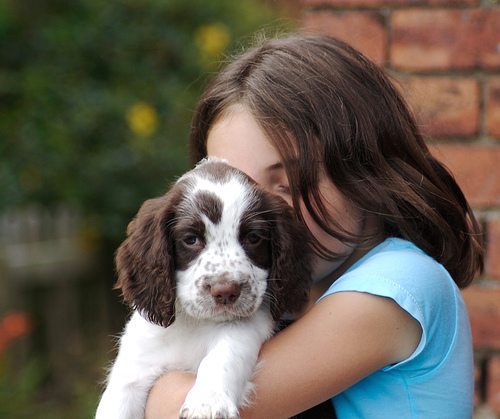Preparing for the arrival of your new puppy will help make the homecoming smoother for you and the puppy. The following is a list of  supplies that are important to ensure her comfort and safety:
supplies that are important to ensure her comfort and safety:
Collar. Shelters and trainers often recommend a Martingale collar for puppies. These are soft, fabric collars that slip over the head and have a small loop attached which mimics a choke collar when the dog pulls. Because puppies don’t know leash etiquette, they often pull backwards and can easily slip out of a regular cloth collar. The Martingale design prevents this from happening and keeps your puppy safe. It is important that the collar fit properly and most pet supply stores will help in finding the right size.
Leash. Leashes are available in leather, nylon, and cotton. It probably isn’t important which material you choose, but don’t spend too much money on one, because there is a good chance your puppy will think it’s a toy and will chew it. A four foot leash is good for walking a new puppy. When she goes into a training class, the instructor will likely recommend a longer one. Retractable leases are not recommended for puppies, as these can make training more difficult.
Identification. Many puppies adopted from shelters have had a microchip implanted. The microchip is injected between the dog’s shoulder blades and contains a code that has been entered in a database. The chip can be scanned to find your name and phone number. Make sure you register your information with the database company. You can have a chip implanted by your vet. Even if you have a chip, it’s a good idea to attach an ID tag to her collar. At a minimum, include the dog’s name and your phone number on the tag.
Bed. Your new puppy needs to feel safe in your home, and having her own bed will help her adjust. Purchase a bed suited to her size and one that has removable, washable covers, as accidents are sure to happen.
Chew Toys. Puppies don’t distinguish between your shoes and their toys. Until your puppy is trained, it is a good idea to give her some safe toys of her own (and to put your shoes away). For puppies under three months, plush toys are recommended. These usually come with squeakers inside, which work to the get the puppy’s attention. Look for plush toys that are durable and that do not have plastic eyes and noses, as these are potential choking hazards. When the puppy begins teething, he will need something harder to chew on. Nylabone is a good brand that makes a durable hard bone. Also consider looking for a toy that can be filled with water and frozen, as this will help ease teething pain. Consider the size of your puppy, and get an appropriately sized toy.
Have fun with your new puppy – and don’t forget to have patience as she learns how to be a good dog.
Photo: Courtesy of smlp.co.uk via Flickr (CC by 2.0)









